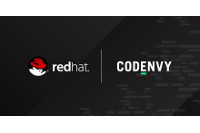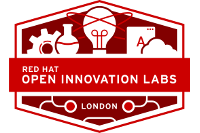Red Hat blog
The Friday Five is a weekly Red Hat® blog post with 5 of the week's top news items and ideas from or about Red Hat and the technology industry. Consider it your weekly digest of things that caught
our eye.


IN THE NEWS:
Red Hat to Acquire Codenvy, Provider of Agile and Cloud-Native Development Tools
Red Hat announced that it has signed a definitive agreement to acquire Codenvy, provider of cloud-native development tools that enable developers to more easily create modern container-based and cloud-native applications. By adding Codenvy to its existing portfolio of developer tools and application platforms, including Red Hat JBoss Middleware and Red Hat OpenShift, Red Hat continues its efforts to provide solutions that enable developers to create applications for hybrid cloud environments. Red Hat plans to make Codenvy an integral part of OpenShift.io, Red Hat's recently announced hosted development environment for building hybrid cloud services on OpenShift.


GOOD READ:
Red Hat Blog - Why Red Hat is acquiring Codenvy - Expanding our cloud-native app dev portfolio [by Harry Mower, senior director, Developer Programs, Red Hat]
At last year's Red Hat Summit in San Francisco, we talked about how Eclipse Che was becoming an important part of our developer tools strategy. A few weeks ago, you saw that come to life with the introduction of OpenShift.io, which includes Eclipse Che. Today, I'm excited to announce that we've taken the next step in that journey and have entered into an agreement to purchase Codenvy, the company behind Eclipse Che. Codenvy is much more than a cloud integrated development environment (IDE). At the heart of Codenvy's technology is a workspace management system that allows developers to get up and running instantly without the need to setup a local development environment. This container-based workspace approach reduces the time it takes developers to get started and minimizes the risk of inconsistencies between development and production environments. This workspace approach also makes working with containers easier for developers. With the acquisition we plan to incorporate Codenvy into future developer tooling built for Red Hat OpenShift, Red Hat's award-winning container application platform. This further enhances OpenShift's developer experience and will enable developers to create container based applications across private and public clouds.


IN THE NEWS:
Red Hat Open Innovation Labs Opens in London to Jumpstart Application Development with Open Source and DevOps
Red Hat announced the opening of Red Hat Open Innovation Labs in London - its first in EMEA - to help customers integrate people, methodology, and technology to catalyze innovation and solve business challenges in an accelerated fashion. Red Hat Open Innovation Labs enable customers to work collaboratively in a residency-oriented lab environment with Red Hat experts. This consultative experience is designed to help customers jumpstart innovation and software development initiatives using open source technology and DevOps methods either at the new physical lab in London or in a pop-up lab at a customer's site. Red Hat Open Innovation Labs' new facility in London is designed to foster a flexible and open way of working, down to the ability to move furniture and redesign the space to build your workspace.


WATCH THE VIDEO:
Open Source Stories - Road to AI
How do you teach a car to drive? For many self-driving car makers and artificial intelligence (AI) researchers, the answer starts with data and sharing. The latest film in the Open Source Stories series "Road to A.I." premiered at the 2017 Red Hat Summit. Watch the full film and learn more about the artificial intelligence revolution.


IN THE NEWS:
CRN - Red Hat's Head Of Products On Competing With Docker, Teaming With AWS And A Container Services 'Renaissance' For The Channel
At open source technologies giant Red Hat, executives say it's their company – not Docker – that is the player to beat in containers for the enterprise. Paul Cormier, an executive vice president who heads Red Hat's technology and products organizations, sat down with CRN during Red Hat Summit 2017 in Boston and had plenty to say about the competition around containers. "You need a production-ready environment to really start to deploy [containers] and bet your business on it, and we're the only one that's proved we can do that. Containers are Linux. Container technology has been around for a long time. But with hybrid cloud now emerging, containers are now the killer app for hybrid cloud because they really allow you to take the application to the different types of footprints of the hybrid cloud. But having said that, it's Linux, just carved up in a different way. Now that you're starting to see it get into production, and being part of customers' hybrid environments, frankly they're realizing it is Linux. And it needs the same security updates, functional updates, support, life cycle, certifications, all of the things that Linux and RHEL [Red Hat Enterprise Linux] gave in the past. The other guys who think they're container providers, they have to run their own Linux now. Enterprises don't want to build their own Linux, and they're the only ones that can support it. I'm just saying, I haven't seen another container solution from another vendor that I would call a successful commercial Linux vendor."
About the author
Red Hat is the world’s leading provider of enterprise open source solutions, using a community-powered approach to deliver high-performing Linux, cloud, container, and Kubernetes technologies.

